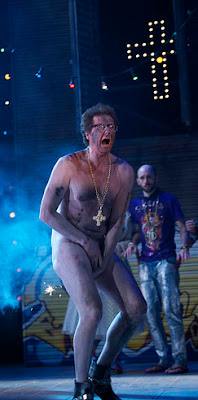 |
Richard III meets Saw VII. |
Many print critics have expressed happy surprise at the unity of style that the Propellants have (supposedly) brought successfully to these Shakespearean scripts, as both are explicitly structured around extreme violence (Comedy plays like outtakes from Tom and Jerry, while Richard's mayhem is straight out of Saw, rusty hacks and all). But alas, they couldn't be more wrong about that success. Although I'll give Propeller's director, Edward-son-of-Peter Hall, at least these props: he savvily realized there were enough structural parallels between Comedy and Richard - both are essentially serial plots (one about a serial killer!), and both are organized around cruelty (onstage in one, offstage in the other) - that Propeller's propulsive fratboy physicality could, with opposing twists, serve approximately for both. So I'll give him points for strategy.
But the violence is offstage in Richard III for a reason - it pulls focus relentlessly from Shakespeare's main concern: the creation of his first great dramatic character. Indeed, his Richard has cast such a cultural shadow that he has all but replaced the historical record (the Bard drew his distorted story from sources sympathetic to the Tudors, who offed Dick to take over from the Plantagenets).
But in the silver-tongued Richard Clothier (above), we have what amounts to an anti-Richard; he's far too attractive for the character's explicitly envious psychology to make sense, and while he speaks Shakespeare's language superbly (the diction problems of Comedy were largely banished here), his eloquence seems utterly unpossessed by any burning drive for power. Clothier comes off as a distinguished under-minister of finance who may be hiding a decidedly nasty streak (he may like to attack helpless women in hotel rooms, for instance) but who could never organize a take-over of the IMF.
Admittedly, director Hall is clearly aware of this gap in the performance; thus he has deployed a chorus of killers (similar to the "Mexican" chorines of Comedy, but dressed in costumes lifted from Patrick Stewart's Macbeth) to drive the murderous action (which includes blinding by acid, dismemberment by chainsaw, a double beheading, the chewing off of fingers, and a ritual disembowelment). Indeed, at one point, when Richard attempts to off one of his own assassins, he finds it impossible to do so; the killer just rises again, apparently indestructible, leaving Richard looking more like the puppet than the puppetmaster. This was actually the most intriguing moment in the production - but it cried out for greater explication (as we suddenly realized Hall's theme was just different from the Bard's). And while I admit that all the torture was diverting, in its way, it just didn't have that much to do with Shakespeare's play; indeed, it was kind of a replacement for the play, because Hall could never figure out how to actually hook up the hip, sadistic energies of Hostel to the chassis of Richard III.
So let's talk, just for a second, about Richard III. I've already described it as a landmark in the canon because of the titanic profile of Richard; wedged between the intermittent brilliance of Henry VI and Titus Andronicus and the stunning structural breakthrough of Midsummer, its unforgettable central characterization constitutes one of the clear steps in "Shakespeare becoming Shakespeare." Behind the sheer forcefulness of Richard as character, however, there are subtler ontological themes at work: the scheming killer exists as something of a Shakespearean factotum, a kind of meta-playwright who all but announces the scene he is about to conjure; his own persona encapsulates, and even stage-manages, the history he's relating. Indeed, he "can add colors to the chameleon, and change shape with Proteus for advantages" (to quote Henry VI, in which he makes his first appearance); Richard is here, there and everywhere (the opposite, really, of Hall's approach). Thus, tellingly, when he is left alone on Bosworth field prior to his defeat, his multitudes of personalities all collapse into a single, guilty one. "I am I," he at last states (compare with Iago's "I am not what I am") - and he admits that "I" is a murderer; so we know immediately his own death cannot be far off.
 |
It's the Duke of Clarence against not just Richard III, but the entire cast. |
Of course if you're persuaded that there should be no difference between what you see at the Huntington and what you see at the multiplex (and there are many like you if you are), then this Richard III is definitely for you. Certainly to many folks - even to many critics - the hoary old idea that art should be about something more than the jolt of a horror movie is - well, precisely that: a hoary old idea. And so I breathlessly await Henry-IV-meets-Saw-VII!






